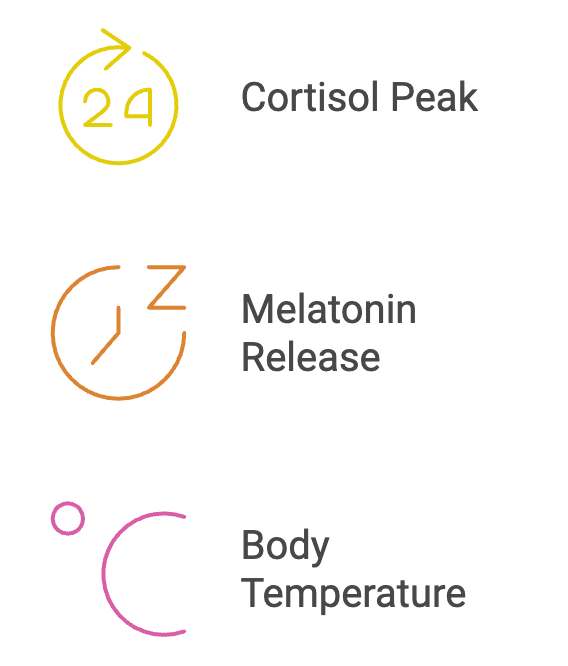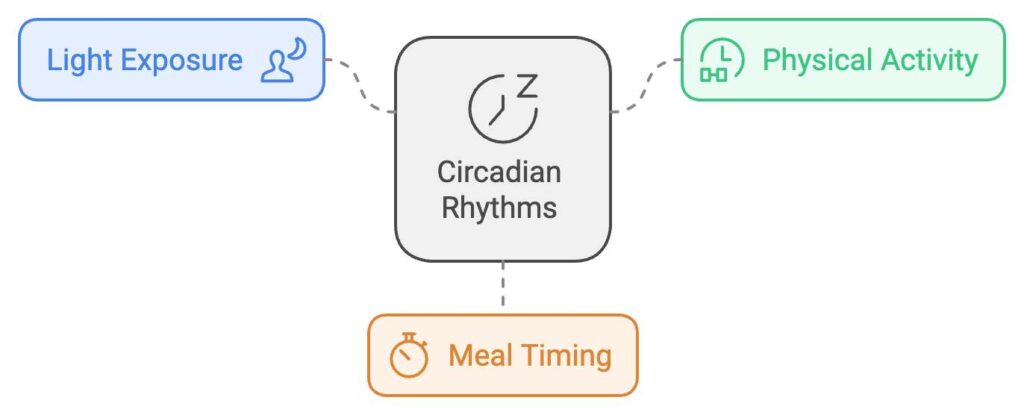Ever wonder why you’re ready to conquer the world at 10 AM but can barely keep your eyes open after lunch? Meet your body’s internal timekeeper: the circadian rhythm. Think of it as your personal biological DJ, mixing the perfect blend of hormones and body temperature to keep you grooving through your day.
This 24-hour biological bass line doesn’t just control when you feel sleepy or alert – it orchestrates everything from your metabolism to your mood. Whether you’re a night owl struggling with early meetings or a shift worker trying to catch some Z’s while the sun’s still up, understanding your body’s natural rhythm could be the key to unlocking better sleep, sharper focus, and more energized days.
Understanding Circadian Rhythms
What Are Circadian Rhythms?
Circadian rhythms are your body’s own clockwork, ticking away on a 24-hour schedule. Think of them as your internal alarm system, keeping you in sync with the sun and stars. These rhythms are nudged along by environmental signals like light and darkness. They tell your body when it’s time to hit the hay or get up and smell the coffee.

“Circadian rhythms are physical, mental, and behavioral changes that follow a 24-hour cycle.” – Dr. Francis Collins, Former NIH Director
Melatonin is your night’s little helper, rising at dusk and saying, “Sleep, my friend!” And when the morning light shines, it gently nudges you awake by lowering melatonin levels. A bump in this clockwork, though, and everything from sleep to your daily mojo goes haywire. So, if you feel off-kilter, maybe your body’s clock needs a little tune-up.
| Circadian Rhythm Component | Function |
|---|---|
| Sleep-Wake Cycle | Keeps you bright-eyed or ready for bed |
| Hormone Production | Handles melatonin, cortisol, and buddies |
| Body Temperature | Up and down it goes, influencing pep in your step |
Importance of a Balanced Circadian Rhythm
Keeping your inner clock ticking smoothly isn’t just about catching ZZZs—it’s got its fingers in all sorts of pies. Your metabolism, mood swings, brain power—it’s all connected. Even the occasional night shift or crazy night out can throw things out of whack, leaving you chasing your own tail with sleep debt and crankiness.
If you’re battling with nodding off, juggling a busy family, working night shifts, or just getting on in years, a wonky circadian rhythm could be pulling the strings behind the scenes. Expect trouble like feeling worn out, hormonal ups and downs, tougher times focusing, and your brain may feel more like a foggy haze.
| Impact of Disrupted Circadian Rhythm | Potential Side Effects |
|---|---|
| Poorer Sleep | Tiredness and maybe a bit grouchy, too |
| Hormone Chaos | Could lead to extra pounds and stress headaches |
| Brain Fog | Concentration goes poof, and productivity takes a hit |
The secret sauce to a happy rhythm is sticking to humble routines: a regular bedtime, easygoing evening habits, and living smart with light and activity. For more pointers, you might wanna check out some sleep hygiene tips or reap the rewards of bedtime rituals.
Signs of a Disrupted Circadian Rhythm
Figuring out if your circadian rhythm’s all out of whack is a big deal if you’re wanting to hit the reset button on your sleep schedule. Catching these signals lets folks tweak their routines to get back in tune with their body’s natural rhythm.
Symptoms of Circadian Rhythm Disruption
Here’s the lowdown on what to watch for if your circadian groove is off:
| Symptom | What It Means |
|---|---|
| Difficulty falling asleep | Tossing and turning longer than normal before dozing off |
| Frequent wake-ups | Popping awake multiple times during the night |
| Daytime drowsiness | Feeling super beat or dragging during the day |
| Moody vibes | More irritable or feeling on edge |
| Appetite changes | Weird hunger swings, often eyeing tasty junk food |
| Foggy brain | Finding it hard to focus or make decisions |
These signs show up in different ways, but they’re usually a cue to switch up your daily grind or bedtime habits. For sleep tips that might help, check out healthy sleep habits.
Impact on Overall Health
When your circadian clock’s out of sync on the regular, bigger health problems aren’t far behind. Studies hook messed-up sleep cycles to a bunch of health woes, like:
| Health Problem | What Could Happen |
|---|---|
| Sleep debt | Racking up lost sleep, leading to constant tiredness (sleep debt) |
| Heart health hits | Bumping up the odds of heart disease and high blood pressure |
| Metabolism mayhem | More prone to packing on pounds and dealing with diabetes |
| Mind matters | Upping the risk of feeling blue or anxious |
| Sluggish immune mojo | Not fighting off bugs as well |
Tackling the stuff that’s throwing things off is a must. For some doable tips, folks might want to peek at evening habits for better sleep. Getting your circadian rhythm back on track can do wonders for your health and your overall feels.
Lifestyle Factors Influencing Circadian Rhythms
Getting a handle on what affects your body’s internal clock can be a real game-changer for anyone struggling with sleep. There are three big hitters when it comes to lifestyle: soaking up some daylight, moving your body, and when you chow down.

Light Exposure
Light, oh glorious light! It signals your body to get moving during the day and tells it to wind down at night. Get your sun fix for energy and curb the artificial stuff in the evening to avoid feeling all wired.
| Time of Day | How Much Sun You Need |
|---|---|
| Morning (6 AM – 9 AM) | Catch at least 30 minutes of sunshine—it’s Mother Nature’s espresso |
| Afternoon (12 PM – 3 PM) | Step outside and avoid glaring screens—you don’t want to fry your brain cells |
| Evening (6 PM onwards) | Dim those bright lights, especially the blue ones from gadgets—your future sleepy self will thank you |
Think of light as your rhythm buddy—more rays in the day, fewer screens at night. Got a gadget addiction? Try a digital detox for sleep to cut down on screen time before bed.
Physical Activity
Moving your body isn’t just about fitting into your jeans—it’s also your ticket to better snoozing. Exercise boosts sleep quality and can help you stick to a routine.
| Workout Style | How Long to Break a Sweat |
|---|---|
| Aerobic Stuff (like walking or jogging) | Shoot for 150 minutes a week |
| Pumping Iron | Hit the weights 2 times a week |
| Chill Vibes (yoga, stretching) | Relax for at least 10 minutes a day |
Outdoor workouts? They’re two-for-one deals: sunlight and exercise, the dream team for your clock. Pondering the exercise-sleep connection? Check out exercise and sleep quality.
Meal Timing
When you eat is almost as important as what you eat. Keep your meals regular to help your body stay in sync—like a well-oiled machine.
| Meal | Best Time to Eat |
|---|---|
| Breakfast | Devour within an hour of waking—it jump-starts your day! |
| Lunch | Wait 4-5 hours after breakfast—keep that fuel tank filled at the right intervals |
| Dinner | Stop munching 2-3 hours before bed to dodge food comas at night |
Avoid late-night food frenzies; your bed and belly will both be better for it. A tidy eating schedule means better Z’s. Curious about how eating impacts sleep? Peek at our piece on weekend sleep patterns.
By tuning into these light, exercise, and meal tactics, you’re setting the stage for rocking your sleep game and tackling any snooze hurdles.
Strategies for Resetting Circadian Rhythms
Dialing in those body clocks can really turn your sleep game around. Here’s a bunch of practical tips to help folks get their snooze back on track.

“The time of day when you carry out an activity is just as important as what you’re doing.” – Dr. Satchin Panda, Circadian Rhythm Expert
Establishing a Regular Sleep Routine
Getting your sleep lined up like clockwork is key. Same sleep-wake time every day keeps your body’s inner alarms in check.
| Day | Wake Time | Bed Time |
|---|---|---|
| Monday | 7:00 AM | 10:00 PM |
| Tuesday | 7:00 AM | 10:00 PM |
| Wednesday | 7:00 AM | 10:00 PM |
| Thursday | 7:00 AM | 10:00 PM |
| Friday | 7:00 AM | 10:00 PM |
| Saturday | 8:00 AM | 11:00 PM |
| Sunday | 8:00 AM | 11:00 PM |
Stick to this schedule, and even Saturdays won’t have to kick you in the snooze button. It keeps you from racking up sleep IOUs and powers up your zzz’s. Hungry for more? See what we’ve got on keeping a consistent sleep schedule.
Making Your Bedroom a Snooze Zone
Where you catch those z’s matters. Here’s how to set the sleepy-time mood in your nest:
| Element | Recommendation |
|---|---|
| Lighting | Dim lights and blackout curtains |
| Temperature | Cool it down (think 60-67°F) |
| Noise | White noise or earplugs, your choice |
| Bedding | Cozy mattress and pillows that hug back |
The right setup helps you chill out and drift away easier. Peek at our stash on building healthy sleep habits.
Skipping the Late-Night Buzz
Staying off the uppers before hitting the hay is a must-do for your body clock. Caffeine, nicotine, and some meds can keep you up. Dodge these several hours before calling it a night to help you nod off.
| Stimulant | Chill-Out Time Before Bed |
|---|---|
| Caffeine | 6 hours ahead |
| Nicotine | 4 hours ahead |
| Big Meals | 2-3 hours ahead |
This trick can seriously turbocharge your sleep. Dig into our guide to evening habits for better sleep.
These moves are your buddies for syncing your internal snooze button with nature, making sleep smoother and boosting your well-being. By nailing down a steady routine, turning your room into a sleep haven, and avoiding what keeps you buzzed, you’re on express to dreamland.
Importance of Wind-Down Routine
You ever try falling asleep only to toss and turn like a rotisserie chicken? A good ol’ wind-down routine helps avoid that. Setting your body clock right boils down to calming rituals before sleep, signaling your body to ease into slumber mode.
Chill Out Tricks
Bringing some chill vibes into your nightly routine makes drifting off a breeze. Try these laid-back moves to help you snooze better:
| Relaxation Technique | What’s the Game Plan? |
|---|---|
| Deep Breathing | Take it easy with deep, slow breaths and relax your brain and muscles. Give the 4-7-8 breathing technique a spin if you’re game. |
| Meditation | Give your stress the boot and sleep better by zoning out with some mindfulness. Test drive those meditation apps for sleep when you’re feeling zen. |
| Progressive Muscle Relaxation | Tighten, then loosen each muscle to kick that tension to the curb. |
These zen tricks can melt your stress away, prepping you for a smooth slide into dreamland.
Kick the Screens to the Curb
The screens? Boot ‘em outta your bedtime routine! Blue light from screens can throw your sleep hormone, melatonin, off-balance. Aim to ditch devices at least an hour before snoozing to keep your sleep cycle in check.
| Screen Time Cut-Off | Time to Resist the Urge |
|---|---|
| Phone/Tablet | 1 hour |
| Computer | 1 hour |
| Television | 1 hour |
Kicking screen time to the curb for the night? Give a digital detox for sleep a shot to ease electronics outta your evening chill zone.
Sweet Sleep Setup
Got the perfect sleep den? It’s a game changer. Here’s what to tweak for those glorious shut-eye hours:
| Room Feature | Best Settings |
|---|---|
| Temperature | Keep it cozy cool, around 60°F to 67°F (15.5°C to 19.5°C) |
| Darkness | Block out light like a sleep ninja with blackout curtains or an eye mask. |
| Sound | Use white noise machines for sleep or earplugs to hush unexpected noises. |
Tweakin’ these bits sets the stage for a primo nap-envy spot. Setting up this sleepy haven leads to a solid snooze schedule, upping your wellness game.
Slip these tips into your evening routine and drift into restful sleep, syncing that body clock just right. For more tips on crafting your perfect sleep prep, peek at our piece on bedtime rituals.
Getting Some Expert Advice
Ever tried fixing your sleep and felt like you were chasing your tail? You’re not alone. Sometimes bringing in the sleep pros can steer you in the right direction. They’re the ones who can break down your sleep habits and dish out practical tips that hit the spot.
Chatting with a Sleep Doctor
Think of a sleep doc as a Sherlock Holmes for your snoozing troubles. They’ve got the know-how to figure out what’s keeping those Zzz’s at bay. Whether you’re wrestling with insomnia that never ends, snoring like a chainsaw with sleep apnea, or your night shifts wreak havoc, they’ve got your back. They’ll size up your sleep and might even run some tests, giving you the DL on your sleep situation.
| Perks of Consulting | What You’ll Get |
|---|---|
| Personal Sleep Hacks | Advice that fits your unique sleep style. |
| Testing Time | Be part of sleep labs or get tests to pinpoint problems. |
| Treatment Tidbits | Tips on different therapies, especially ones that change behavior. |
One solid option for sleep strugglers is giving Cognitive Behavioral Therapy for Insomnia (CBT-I) a whirl—proven to tweak those sleep habits for the better.
Checking Out Treatment Paths
Once the doc’s dug through your sleep habits, they’ll roll out a range of solutions from changing your routine to opting for meds.
| Treatment Paths | Breakdowns |
|---|---|
| Mind Tricks | Stuff like keeping a sleep diary or practicing bedtime behaviors that boost sleep quality. |
| The Med Cabinet | Sleep pills that might be okay for a quick fix while you sort out a long-term pattern. |
| Gadgets Galore | Tools like best sleep trackers or white noise machines for sleep to keep an eye on and boost your sleep. |
| Going Holistic | Things like meditation or the 4-7-8 breathing trick to help you chill and drift into dreamland. |
If your shifts are all over the place and your sleep schedule’s as scattered as your sock drawer, customized plans, like nailing down a regular sleep routine, could be your ticket to peaceful nights. Adding soothing bedtime rituals could further ease you into dreamland.
With the support of a sleep specialist’s tailored guidance, anyone dealing with sleep troubles can start getting their clock back on track and catch those solid hours of sleep they’ve been missing.
Tips for Parents and Shift Workers
Getting enough sleep can be a real head-scratcher for parents and folks who work shifts. Creating solid sleep habits is like hitting the jackpot for feeling more rested. Let’s dive into some handy advice on making your sleep space and routine work for you.
Cleaning Up Your Sleep Act
Taking charge of your sleep habits can change the game. Check these out:
| Sleep Smarts | What’s It All About? |
|---|---|
| Stick to a Schedule | Hit the hay and wake up around the same time daily, even on those lazy weekends. Keeps your body’s sleep schedule in line. Curious? Check out our piece on consistent sleep schedule. |
| Chill Before Bed | Wind down with some relaxing bedtime moves. Try reading or giving the 4-7-8 breathing technique a whirl. Want more ideas? Peek at bedtime rituals. |
| Screen-Free Zone | Power down the gadgets before hitting the sack. The blue light messes up the sleep hormones, so give digital detox for sleep a shot. |
Tweak Your Timetable
Parents and those working crazy hours can tweak their routines to make sleep a little more friendly. Here’s the lowdown:
| Schedule Hacks | What’s the Deal? |
|---|---|
| Early Kiddo Bedtimes | Get the kiddos to bed earlier to bump up everyone’s sleep time, even for grown-ups. Helps the whole fam get that golden shut-eye. |
| Nap Like a Pro | Shift workers, sneak in strategic naps during breaks. A quick power nap of 20-30 minutes can refuel your batteries. |
| Keep Weekends in Check | Avoid sleeping in too much on weekends if your sleep schedule’s all over the place. Stick to a pattern to keep the sleep debt at bay. |
Tweaking how you snooze and adjusting your daily shuffle can help reset your inner body clock. These tidbits can help parents and shift warriors get better sleep and feel more alive. Dive into these tricks to build a sleep routine that cranks up your energy levels and keeps you on your A-game.
Conclusion
As we’ve explored the fascinating world of circadian rhythms, it’s clear that these internal timekeepers are more than just sleep regulators – they’re the conductors of our biological orchestra. From the morning light that kickstarts our day to the evening wind-down that signals sleep, every habit and environmental cue plays a crucial role in keeping our internal clock ticking smoothly. Whether you’re resetting your rhythm after jet lag, adapting to shift work, or simply trying to optimize your daily routine, remember that small, consistent changes can lead to significant improvements in your sleep, health, and overall well-being. So next time you feel out of sync, don’t just push through – tune in to your body’s natural rhythm and let it guide you back to balance.
FAQs
Can circadian rhythms be permanently changed?
While circadian rhythms can be adjusted, they can’t be permanently altered as they’re biologically hardwired. However, you can successfully adapt them to different schedules through consistent routine changes.
How long does it take to reset circadian rhythms?
Generally, it takes about one day per time zone crossed to adjust your circadian rhythm. For lifestyle changes, expect 1-2 weeks of consistent routine to notice improvements.
Do circadian rhythms change with age?
Yes, circadian rhythms naturally evolve throughout our lives. Teenagers tend to be night owls, while older adults often become early birds.
Can food affect circadian rhythms?
Yes, meal timing significantly impacts circadian rhythms. Regular eating schedules help regulate your internal clock, while late-night eating can disrupt it.
How do seasons affect circadian rhythms?
Seasonal changes in daylight hours can influence circadian rhythms, which is why some people experience seasonal mood changes or sleep disturbances.
Additional resources
- National Institute of General Medical Sciences: “Circadian Rhythms”
https://www.nigms.nih.gov/education/fact-sheets/Pages/circadian-rhythms.aspx - Sleep Foundation: “What is Circadian Rhythm?”
https://www.sleepfoundation.org/circadian-rhythm - The American Journal of Medicine: “The Role of Circadian Rhythms in Health”
https://www.amjmed.com/article/circadian-rhythms-health








